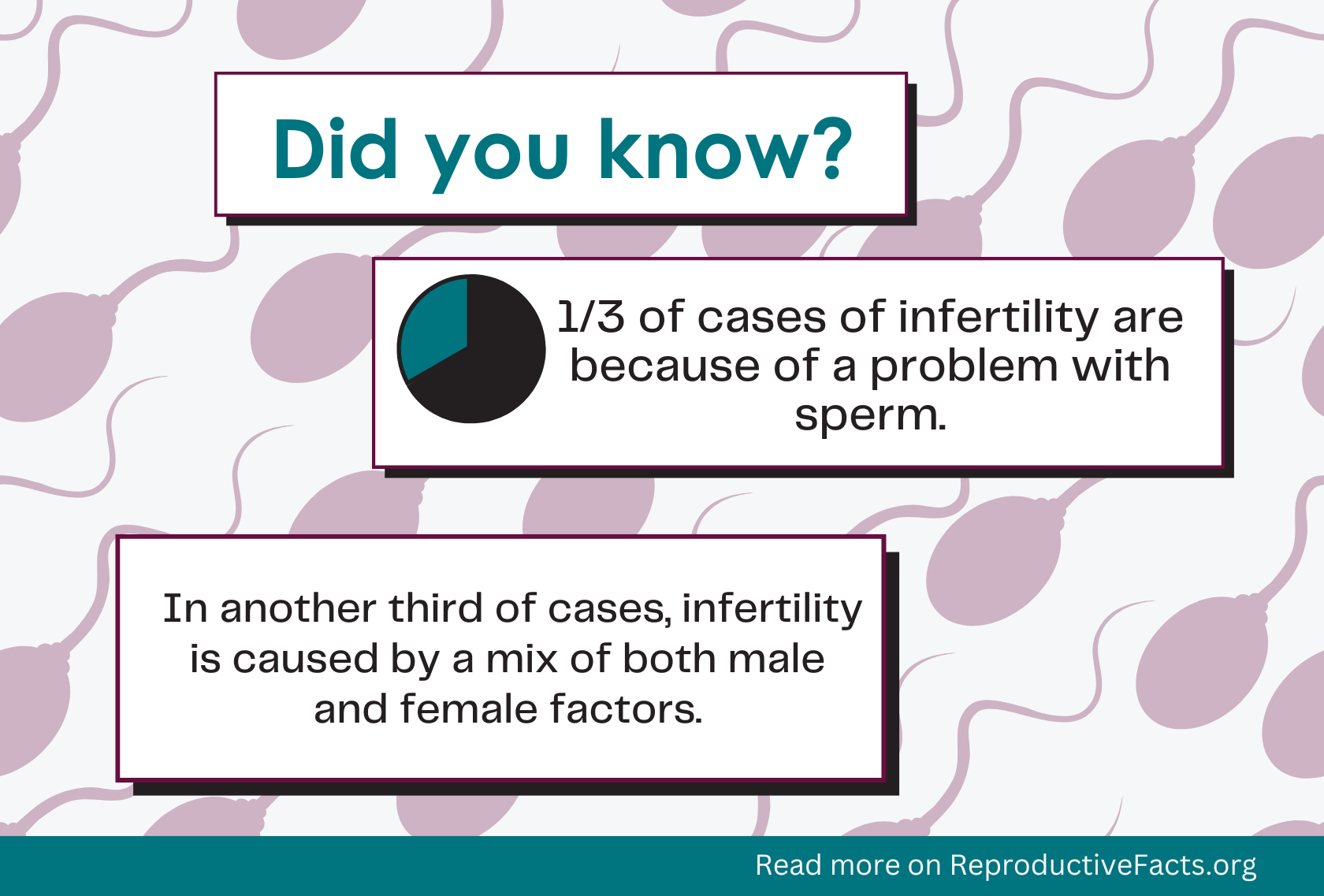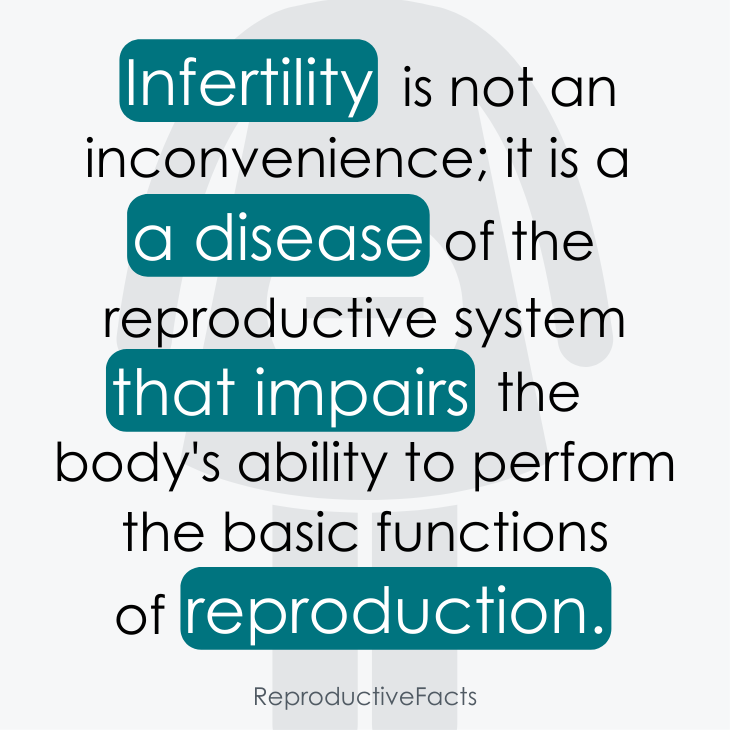
Defining Infertility
Revised 2023
What is infertility?
Infertility can be defined as:
- The inability to achieve a successful pregnancy is based on multiple different factors, including but not limited to your health, age, physical findings, and test results.
- The need for medical help to conceive, like using donor eggs, donor embryos, or donor sperm to become pregnant, either on your own or with a partner.
- For heterosexual couples, if you’re having regular, unprotected sex and are unable to become pregnant, it’s time to seek help. This should start after 12 months if the person with ovaries is under 35 years old and after 6 months if the person with ovaries is 35 or older.
 How common is it?
How common is it?
Infertility affects 10%-15% of heterosexual couples. This makes it one of the most common diseases for people between the ages of 20 and 45. In addition, the longer someone tries to get pregnant without conceiving, the lower the chances are to get pregnant without medical treatment. Most (85%) couples with normal fertility will conceive within a year of trying. If a couple doesn’t conceive in the first year, their chance of conceiving gets lower each month.
What can cause infertility?
Age
Age can have a big effect on the ability to have a baby, especially since egg quality and number decline in the 30s and 40s. For a healthy person in their 20s or early 30s, the chance of conceiving each month is 25%-30%. At 40 years old, however, the chances are 10% or less.
Ovulation Problems
Ovulation (the release of an egg from the ovary) typically occurs about once a month. Problems like polycystic ovary syndrome (PCOS), thyroid disease, and other hormonal disorders can affect ovulation and lead to infertility. Not having a regular menstrual period may be a sign of not ovulating. A person’s weight may also increase the risk of having a problem with ovulation. If periods are not occurring regularly, an individual may want to see a doctor who specializes in fertility (a reproductive endocrinologist) in the first year of trying to get pregnant.
Damaged or Blocked Fallopian Tubes
Fallopian tubes are the tubes attached to the uterus where the sperm and egg usually meet. Blocked or damaged tubes can cause infertility or ectopic pregnancy (pregnancy outside the uterus). The chances of having blocked tubes are higher with a history of endometriosis, surgery in the pelvis, or sexually transmitted infections (like gonorrhea or chlamydia).
Issues with sperm and/or ejaculation

A third of all cases of infertility are because of a problem with a partner’s sperm. In another third of cases, infertility is due to a combination of problems in both partners. There may be difficulty in making sperm or with ejaculation (the release of semen from the penis). Sperm quality is measured by the amount, the movement, and the shape of sperm. Sometimes other medical problems can affect the ability to make normal amounts or normal quality sperm. Diabetes, for instance, might result in trouble ejaculating. Cystic fibrosis might result in a blockage that prevents the sperm from being ejaculated. Being overweight, smoking, and marijuana use increases the chances of having problems with sperm quantity and quality.
What can I do about my infertility?
Going to see a fertility specialist may help a couple figure out why they’re not conceiving. Women and people with ovaries and/or a uterus should start by seeing a reproductive endocrinologist. Men and people with sperm should see a reproductive urologist who specializes in fertility, especially if a prior semen analysis was not normal. In some (10% or more) cases, though, there may not be an obvious reason why a couple can’t conceive. This is known as unexplained infertility. Fertility treatments can still help couples with unexplained infertility.
When should I see a specialist?
Generally, a couple should see a reproductive endocrinologist if they have not been able to conceive within 12 months of trying (or after 6 months of trying after the age of 35).
 A family history of early menopause, health problems that can cause early menopause, or a history of cancer treatment in either partner, are other reasons to consider seeking fertility advice sooner.
A family history of early menopause, health problems that can cause early menopause, or a history of cancer treatment in either partner, are other reasons to consider seeking fertility advice sooner.A couple might also seek a fertility consultation sooner if there is a risk for infertility such as irregular menstrual cycles or potential risk for fallopian tube damage. Childhood problems with the testicles or difficulty with sexual function are other reasons someone may consider an evaluation sooner.
For more in-depth information about infertility and infertility testing, please see the ASRM booklet titled “Infertility: An Overview.” For more information about fertility treatments such as in vitro fertilization (IVF) and intrauterine insemination (IUI), please see the ASRM booklet titled “Assisted Reproductive Technologies.”
Fact Sheets/Booklets
View more fact sheets and booklets written by the ASRM Patient Education Committee.
Menopausal Transition (Perimenopause): What Is It?
The menopausal transition (perimenopause) is the period that links a woman’s reproductive (childbearing) years and menopause.
Osteoporosis
Osteoporosis and osteopenia are conditions of having low bone mass (density).
Hyperprolactinemia (High Prolactin Levels)
Prolactin is a hormone produced by your pituitary gland which sits at the bottom of the brain.Infertility
Find a Health Professional











